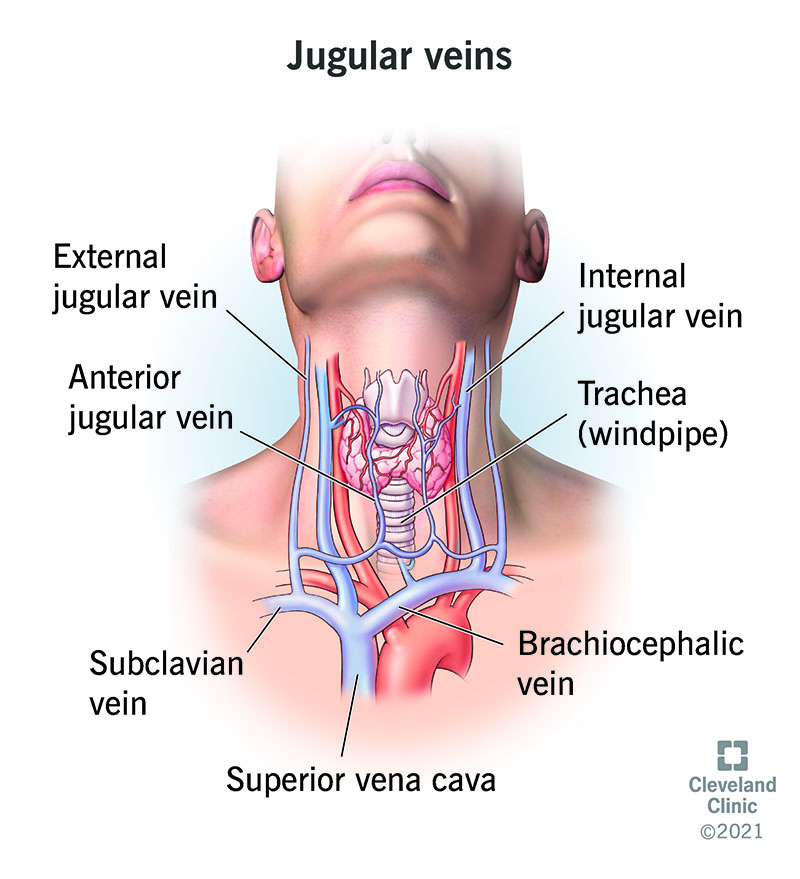The jugular veins include three pairs of veins in your neck. The three pairs are the interior, exterior and anterior veins. These veins are important because they return blood from your brain back toward your heart. They can help with diagnosing many different medical conditions. They also offer easy access for intravenous (IV) lines.
Advertisement
Cleveland Clinic is a non-profit academic medical center. Advertising on our site helps support our mission. We do not endorse non-Cleveland Clinic products or services. Policy

Image content: This image is available to view online.
View image online (https://my.clevelandclinic.org/-/scassets/images/org/health/articles/23148-jugular-vein-2)
The jugular veins are major blood vessels that stretch from your head to your upper chest. Typically, there are three pairs of jugular veins — six in total — each of which directs blood from different areas of your head toward your heart.
Advertisement
Cleveland Clinic is a non-profit academic medical center. Advertising on our site helps support our mission. We do not endorse non-Cleveland Clinic products or services. Policy
The jugular veins are very important because your head — especially your brain — has an enormous need for oxygen. Though the average human brain weighs about 3 lbs., your brain gets about 15% to 20% of the blood your heart pumps out. Your face, scalp, ears and other parts of your head also need plenty of blood flow for a wide range of reasons.
Once the blood delivers the oxygen to the brain and other parts of your head, it needs to return to the heart to make way for incoming blood. It does that by traveling through the jugular veins. Those veins ensure that blood flows smoothly and continuously to and from your brain.
The two sets of jugular veins are the interior and exterior jugular veins.
Advertisement
Once the jugular veins pass through your neck, they connect to other major veins as follows:
The brachiocephalic veins merge just below where your neck meets your chest. The connected veins form a larger vein, the superior vena cava (vee-nah cay-vah). The superior vena cava is the largest vein in your body. It’s the vein that carries all the blood that’s returning from your body into your heart.
The signs and symptoms that affect your jugular veins can happen around them or in areas connected to them, especially in your head.
The most common tests on the jugular vein involve either a physical examination or imaging tests.
Advertisement
Some of the more common treatments for jugular vein conditions, or that use the jugular veins as an access point to treat other conditions, include:
Some of the best ways to care for and maintain your jugular veins’ health include:
Advertisement
The jugular veins are a major part of your circulatory system, especially because they affect blood flow in your brain. While there aren't many conditions and diseases that affect them directly, the jugular veins commonly play a role in diagnosing and treating other conditions. If you have questions about potential jugular vein issues, talk to a healthcare provider. They can answer your questions or help you find a specialist who can assist you further.
Advertisement

Sign up for our Health Essentials emails for expert guidance on nutrition, fitness, sleep, skin care and more.
Learn more about the Health Library and our editorial process.
Cleveland Clinic’s health articles are based on evidence-backed information and review by medical professionals to ensure accuracy, reliability and up-to-date clinical standards.
Cleveland Clinic’s health articles are based on evidence-backed information and review by medical professionals to ensure accuracy, reliability and up-to-date clinical standards.
Cleveland Clinic’s primary care providers offer lifelong medical care. From sinus infections and high blood pressure to preventive screening, we’re here for you.
